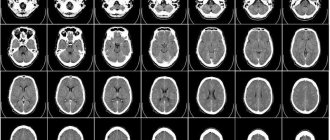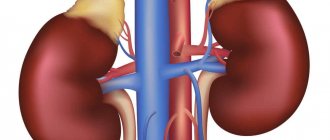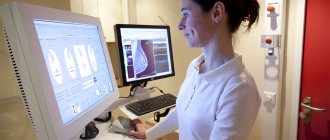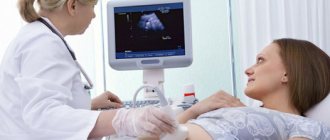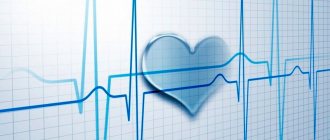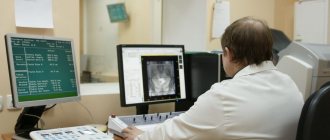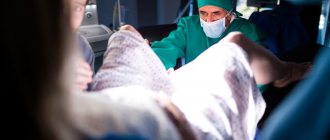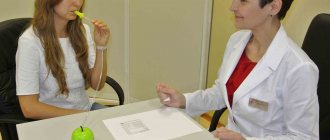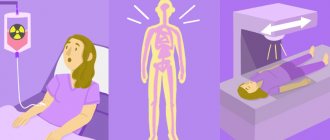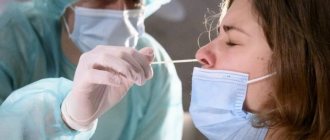The life of a modern person is filled with many different events and proceeds at a rapid pace. Work and study, building a successful business or career, starting a family and raising children - all this takes a lot of effort and time. And health takes a back seat, although maintaining it is important for both young people and older people. Many diseases, including diabetes mellitus, hypertension, myocardial infarction, etc., can be detected and prevented in the early stages. However, due to the absence of obvious symptoms, people do not turn to doctors, so over time the disease enters an advanced stage.
In order to find out about dangerous diseases or a predisposition to them in time, you must at least undergo
a complete examination of the body . It also goes by other names - comprehensive diagnostics, or check-up of the whole organism (in the Western style). Such an examination acts as a kind of check, “control measurements,” and allows timely identification of negative changes and dangerous symptoms. Doctors recommend doing this regularly, starting from the age of 18, regardless of gender, age and lifestyle. Brief information: the concept of chek-up and the methodology for its implementation were developed and tested by American doctors. The ultimate goal was to preserve people's health and detect hidden diseases at their earliest stages. This is when properly selected therapy gives the best results. The technique quickly became widespread and is now successfully used in various countries around the world.
What does a full medical examination include?
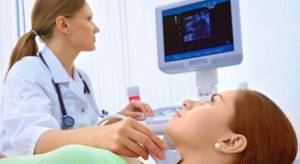
Today, a complete medical examination is a kind of program of activities. It includes:
- Initial consultation with a general practitioner.
- A set of laboratory tests (for example, blood tests - general, hormones, etc.).
- A number of hardware studies of various systems and organs (ultrasound, ECG, gastroscopy, radiography, etc.).
As a result, a comprehensive report on the state of the human body is compiled (in writing). Moreover, you can get it in a fairly short time. It is supplemented by medical opinions and recommendations. Therefore, it helps to correctly select both medication and sanatorium-resort treatment, optimal types of physiotherapy, procedures, etc.

For each person, such a program is selected individually. At the same time, Rixos Prykarpattya specialists take into account:
- Human needs and wishes.
- The current state of the body.
- The presence of chronic pathologies.
- Age category of the patient.
If you disassemble the standard diagram, you check:
- Function of the liver and kidneys.
- Condition of the genitourinary system and gastrointestinal tract, thyroid and pancreas.
- Functioning of the heart and blood vessels.
In order for the results of complex diagnostics to be accurate and reliable, it is recommended to carefully select the place for its implementation. Rixos Prykarpattya offers its patients:
- Advanced European equipment.
- An excellent laboratory where proven reagents are used.
- Individual approach to solving various issues.
- A staff of highly qualified specialists.
- Comfortable conditions for the examination.
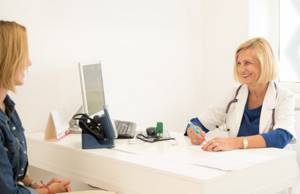
Here are some examples of individual appointments that a body check may include:
- For women aged 40 years and older - mammography and checking stool for hidden blood inclusions.
- For smokers - a pulmonary test and consultation with a pulmonologist.
- For people suffering from shortness of breath and excess weight - a check of the heart and blood vessels, stomach, as well as consultation with a nutritionist.
- For those who complain of frequent headaches and fatigue - magnetic resonance imaging of the brain, consultation with a neurologist, etc.
When is it necessary to do a complete diagnosis of the body?
The optimal frequency with which full medical examination This opinion is shared by both domestic and foreign doctors. After 50 years, it is recommended to increase the frequency of complex diagnostics and do it once a year.
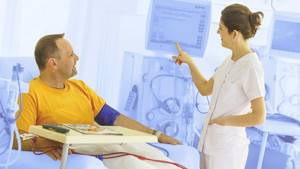
For example, those who have a risk of hereditary transmission of chronic diseases, are registered with a specialized specialist, have vague health complaints, etc. If you often complain of severe fatigue, weakness, suffer from insomnia, digestive disorders, or are prone to stress and headaches, it is simply necessary to regularly examine your body . And you can start soon. In some cases, unscheduled comprehensive diagnostics are allowed: for example, in case of a sharp deterioration in health for no apparent reason, or in women - when planning a pregnancy. You can undergo comprehensive diagnostics at any time of the year. But most people prefer to do this during the holidays. Therefore, Rixos PR cordially offers to combine business with pleasure: get examined, improve your health and relax in the fresh air in the Carpathians.
Who should undergo check-in?
- Regularly (every two to three years) a full body examination is recommended for all men and women aged 25–30 years. Of course, people with chronic diseases or who are predisposed to developing certain diseases should be examined more often. After 50 years, when the risk of developing diseases increases, medical examination is recommended annually.
- It is also worth paying attention to the check-up service for people with vague health complaints. Unfortunately, rarely does anyone feel completely healthy, especially after 40 years. A sedentary lifestyle, constant stress, errors in nutrition - all this sooner or later affects the condition of the body. A person begins to worry about various ailments: increased fatigue, weakness, headaches, digestive problems, and the like. In such cases, you can undergo an examination to find out the cause of poor health and begin treatment on time.
- Finally, periodic comprehensive diagnostic testing is recommended for those who have unfavorable heredity. If any of your close relatives have had cancer or other diseases in the development of which genetic mechanisms are believed to have played a role, then regular medical examinations can help identify the possible disease at an early stage. During a preliminary conversation, the doctor will determine what tests need to be taken for patients with certain risk factors.
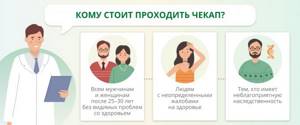
Standard and additional check-out programs are now included in the list of services in many private clinics and medical centers in Moscow and major Russian cities.
CHECK-UP direction Many clinics offer both preventive examination programs to assess the general condition of the body, and narrowly focused ones - to diagnose a specific disease. Selecting a program THERE ARE CONTRAINDICATIONS. YOU MUST CONSULT A SPECIALIST
Where to start a full examination of the body?

If you are interested in diagnosing the body, you should first undergo a preliminary consultation with a therapist. He will help you choose the right program for a complete examination, and, if necessary, adjust and supplement it. The initial appointment takes place in the format of a conversation. During this process, the patient must:
- Indicate the purpose of undergoing diagnostics (general check of the body’s condition, identification of new diseases, etc.).
- Describe the symptoms as fully as possible.
- Mention the individual characteristics of the body (heredity, allergies, etc.).
- Tell us about your regime, nutrition, habits (including bad ones).

To prescribe a suitable examination, it is very important to tell the doctor about your medical history, hereditary factors, as well as the medications you are currently taking. If possible, you can take with you your outpatient card, diagnostic data and the results of the latest tests. A standard check-up program simultaneously pursues several goals:
- Objective assessment of the work of the most important internal organs and systems.
- Timely detection of underlying diseases.
- Selection of individual recommendations for maintaining and promoting health.
In some cases, it is supplemented with specialized research that can solve specific problems. For example, for people over 60 years of age, consultations with a nutritionist and cardiologist will help reduce the load on the heart and blood vessels, reduce cholesterol in the blood, prevent myocardial infarction and stroke, etc.
How long does the examination take?
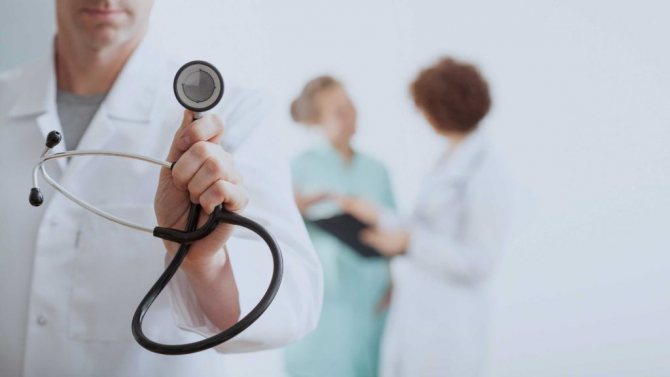
Some people, due to a lack of knowledge, put a comprehensive examination of the body on a par with a medical examination. But these are two different concepts. A professional medical examination allows you to make a conclusion about the suitability of an employee for certain types of work. To complete it, sometimes you have to spend a lot of time and effort (4-7 days), and the reliability and accuracy of the results may be questionable. A medical examination can be done at a regular clinic. But to do this, you will have to independently go to the offices of highly specialized doctors, armed with an appointment sheet.
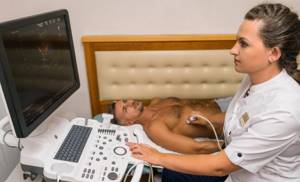
In contrast, a full health check at Rixos Prykarpattya is much easier and faster. Its duration is determined by the list and features of certain studies. On average, diagnosis takes from 1-2 to 6 days maximum. In this case, the examination takes place in a mode that is comfortable for the patient. And the person himself receives not only a medical report on the condition of the body, but also:
- Detailed recommendations.
- Referrals to specialized specialists.
- Individual prescriptions for the treatment and prevention of specific diseases.
The exact duration of the diagnosis can be found out during the initial consultation. Here are a few explanations why the examination may take time:
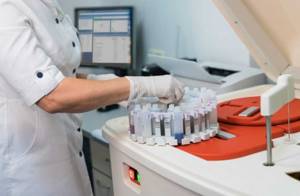
- Certain types of laboratory tests require the use of special reagents. Not all of them act instantly. Therefore, even a detailed blood test will take some time.
- Some tests require certain preparation from the patient. For example, ultrasound of the stomach and abdominal cavity is performed on an empty stomach.
- Any patient needs rest to restore the body. If you go early in the morning to get tested, do not plan to undergo all other types of diagnostics on the same day. After the tests, you should eat and rest a little - this will only be beneficial.
Benefits of the survey
The main advantage of a full comprehensive MRI is the ability to scan all systems and organs in one procedure, which reduces diagnostic time and increases the chances of recovery.
Efficiency is achieved due to the ability to change the contrast of the image, which allows you to visualize different types of tissue. Another major advantage is the ability to create images in any plane without moving the patient. MRI diagnostics is based on the phenomenon of magnetic nuclear resonance, which, unlike CT and X-rays, allows examination without harm to health. The images obtained during the scan make it possible to diagnose diseases in the early stages. including hidden processes, when standard instrumental and laboratory examination methods do not yet reveal violations.
The price of a comprehensive MRI of the whole body is not affordable, however, the impeccable quality and efficiency of the examination fully meets the patient’s expectations.
How much does a full body examination cost?
A detailed health analysis allows you to detect almost all major disorders in the body. Based on the results of a complete examination, the doctor can determine which organs have failed. Timely diagnosis allows not only to prevent dangerous diseases, but also to reduce the risk of disability. Many patients are frightened by the fact that they will have to pay for a full examination of the body. But if you compare it with the cost of treatment, the difference is simply huge. Today it is much more profitable to regularly undergo diagnostics and engage in prevention than to be treated for another exacerbation.
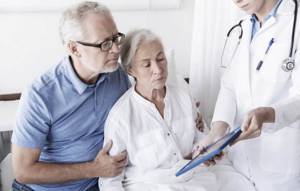
The price of complex diagnostics depends on the following factors:
- Type of program (express - carried out at an accelerated pace, full - gives a detailed picture of the state of your health).
- List of basic and additional studies.
- Age category of the patient, etc.
The cost of the program starts from 2600 UAH . It already includes an initial consultation with a therapist, blood and urine tests, an ECG and several types of ultrasound. For patients aged 60 years and older, the examination program is much more extensive and includes specific types of studies (such as a rheumatoid panel, two types of cardiography, etc.). If there are special doctor's orders, the cost of diagnostics may vary. You can find out the approximate amount, as well as the specifics of the examination, during the initial consultation.
Laboratory diagnostics
Modern diagnostic methods include, first of all, laboratory diagnostics - the study of various environments of the body in order to determine the condition of tissues, organs and identify possible disorders in their work. This diagnostic method allows:
- confirm or exclude the clinical diagnosis, establish its cause and clarify its severity;
- identify hormonal disorders;
- detect the presence of an inflammatory process;
- identify deficiencies of vitamins and macroelements.
Where can you get your body examined?

Today there are many opportunities to undergo a complete medical examination. In the capital and large cities, this service is offered by wide-ranging medical centers and clinical diagnostic laboratories. If you wish, you can also be examined abroad, but this will require additional expenses: an open visa, payment for air tickets, accommodation, etc. A distinctive feature of foreign clinics is that well-known specialists work there, and the patient can receive diagnostic results via email. In developed countries of Europe, the USA and Canada, they take good care of their own health. Therefore, it is practiced to undergo a full medical examination of the entire family. In our country, every year more and more people are showing increased interest in full diagnostics, and rightly so. After all, in almost 80% of cases, the disease is easier to prevent than to cure.

Rixos Prykarpattya offers a comprehensive solution: diagnostics, treatment and prevention of a wide range of diseases, combined with a comfortable stay. Practice shows that this approach gives the best results.
